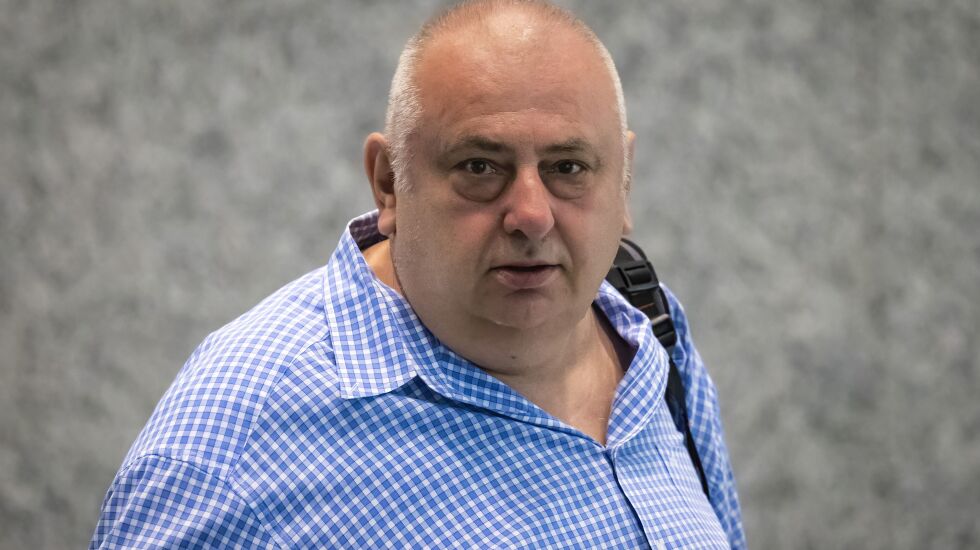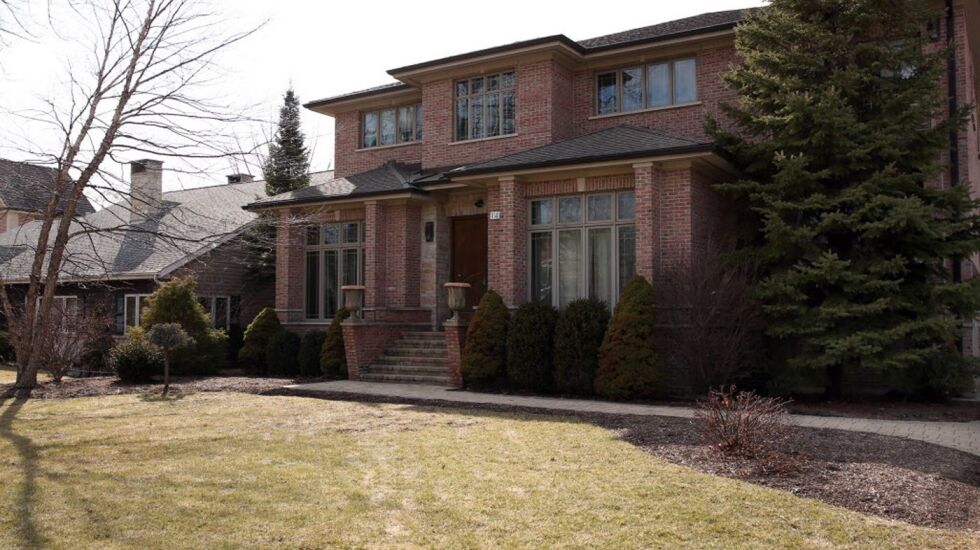
More than five years after the president of a politically connected Bridgeport bank was found dead in a customer’s Park Ridge house, a federal jury convicted the homeowner Friday of embezzling $6 million from the bank.
Marek Matczuk — who said he did odd jobs for tiny Washington Federal Bank for Savings and its employees — was given the money between 2007 and 2017 at the direction of the late John F. Gembara, who was the chief executive officer and majority shareholder of the bank, founded by Polish immigrants to serve their community more than a century ago.
Jurors had been told that Gembara died but not that he was found dead in the main bedroom of Matczuk’s million-dollar home on Dec. 3, 2017, with a rope wrapped around his neck and around the railing of a spiral staircase.
Twelve days later, federal regulators closed the bank.
Gembara’s death was ruled a suicide. But his widow, her attorney and others have said they suspected he was killed as federal regulators began unraveling the massive embezzlement scheme that brought down the bank.
The collapse exposed Gembara’s ties to the Daley family:
- William Mahon — a former high-ranking City Hall official under three former mayors who was part of the Daleys’ 11th Ward Regular Democratic Organization — was on the bank’s board for nearly 20 years, until it collapsed.
- Shortly before the bank closed, Gembara gave the ward organization a loan to repair its Bridgeport headquarters.
- Patrick Daley Thompson, a grandson of the late Mayor Richard J. Daley and nephew of former Mayor Richard M. Daley, got $219,000 from Gembara and had to resign his seat on the Chicago City Council last year after being convicted of cheating on his taxes and lying to bank regulators about how much money he got from the bank.
Prosecutors have charged 16 people in the wake of the bank failure. Four have been convicted in three trials. The others pleaded guilty, including three bank board members and six bank employees. Most await sentencing by U.S. District Judge Virginia Kendall.
But the investigation of the failed bank continues as officials try to recover more of the nearly $140 million the Federal Deposit Insurance Corp. spent to cover the bank’s losses. So far the FDIC has recovered about $60 million.
Testifying against the advice of his attorneys, Matczuk told jurors he never embezzled money from the bank, saying Gembara paid him $3 million over a decade for doing various jobs at the bank, at Gembara’s home and at his daughters’ schools, though he never submitted invoices for any of that.
“I was receiving the money he owed me. It was always too little,” Matczuk told jurors, saying he “never had enough money to finish” building two homes financed by Gembara’s bank. “I never paid any money or kickbacks to John Gembara.”
The jury also convicted co-defendant Miroslaw Krejza, another handyman, who got $2.6 million from the bank. Matczuk and Krejza face sentences of up to 35 years in prison. Matczuk was immediately taken into custody after prosecutors said they fear he might flee to Poland.
Both men had gotten millions in loans from Gembara to build a few homes on the North Side. Some of those houses sat unfinished for years as Gembara paid the property taxes and kept adding that cost to their outstanding loans.
Like other preferred customers described in Washington Federal Bank trials as “Friends of John,” Matczuk and Krejza made no payments on their loans, which kept growing with each check they got.
Prosecutors Brian Netols, Michelle Petersen, Kristin Pinkston and Jeffrey Snell showed the jury records detailing how the men spent money, on trips to Poland, vacations and cars. Matczuk also spent hundreds of thousands of dollars playing slot machines at casinos, according to testimony.
Gembara’s relationship with the men dated to the early 1990s. His longtime friend and business partner Robert M. Kowalski, a Chicago lawyer, introduced him to Boguslaw Kasprowicz, a contractor who got loans to build million-dollar homes in Bucktown and Wicker Park.
Kowalski was found guilty of embezzling $8 million from the bank.
Kasprowicz has pleaded guilty to embezzling about $14 million, spending about $1.7 million to pay Gembara’s bills.
Kasprowicz introduced Gembara to Matczuk and Krejza, who wanted loans to build homes. Kasprowicz and Krejza are brothers-in-law. Kasprowicz’s and Matczuk’s wives went to the same high school.
It’s unclear why Gembara showered the men with money without requiring them to repay the loans or foreclosing on their property.
“I don’t know why he gave me the money,” Kasprowicz testified about Gembara during questioning from Krejza’s attorney Lisa Wood. “You’d have to ask him.”
Besides building a few homes, the three men ended up doing odd jobs around the bank, such as landscaping and painting, and at Gembara’s Palos Hills home. Kasprowicz helped move Gembara’s daughters to out-of-state colleges and, according to testimony, was ordered to pay some of Gembara’s credit-card bills and monthly payments on a small yacht he bought with Kowalski and his brother William Kowalski, who also is charged in the embezzlement scheme but is cooperating with investigators.
On Nov. 28, 2017, Gembara was suspended by the bank board, which included his sister Janice Weston, at the direction of federal regulators.
He turned to Kasprowicz for help and then Matczuk, who offered a place to “hide,” Pinkston told the jury.
Matczuk testified that he never told the Park Ridge police Gembara wanted a place to hide.
Gembara called Kasprowicz, who testified he didn’t get the call because he was flying to Los Angeles — where he owns a home bought with money embezzled from the bank.
He told jurors that, when he landed, he called Matczuk and was told Gembara was asleep at Matczuk’s home.

The Chicago Sun-Times has reported that Matczuk told the Park Ridge police he got several calls on Dec. 1, 2017, from Gembara, saying “that he is in ‘trouble’ with his bank and needed a place to stay” for the weekend.
According to police reports, Matczuk said he met Gembara that evening in Wicker Park at a house the contractor was building with a loan from the bank, Gembara parked his car in the garage, and Matczuk drove them to his Park Ridge home, where he and his family still live.
Matczuk told police he and his wife let Gembara stay in their bedroom while they slept in the living room. The next afternoon, Matczuk’s son told the police, he drove Gembara to a Home Depot in Niles to buy a green rope to hang Christmas decorations at his home in Palos Hills.
Matczuk and his family said they checked on him the next day and found him in a chair with the rope around his neck and the railing of a spiral staircase.
Matczuk “related he does not know where the rope came from and he has never seen it before,” according to a Park Ridge police report. “He denied having any knowledge about Mr. Gembara’s suicide or being complicit in the suicide.”







